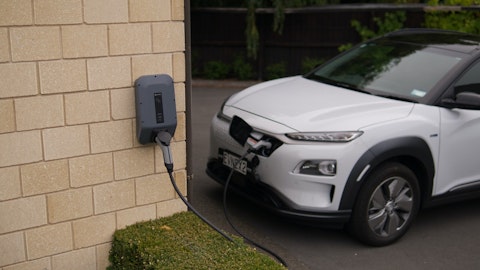Nicolas Brunet : Let me start by saying that in the truck space, the truck EV market for the Class 5 days is really still at adjacency, right. If you look at it as of June 30th this year, there were less than 1,000 vehicles registered. And based on this data, the Lion would be the fourth player in the space. So we’re one of the very two players with critical math and importantly with a purpose built product out there. We have seen some positive legislation. You talked about California advanced clean fleet. That’s certainly positive development. This is more on the regulation side. And typically, yes, we’ve seen that following regulation is the modification at UL of the subsidy programs. We don’t have direct visibility into that, but we’ve seen it in other markets and we’re certainly hoping it will be the case as well.
Altogether, again, the market is just at the beginning and we have the product and the manufacturing capacity to accommodate clients as things ramp up. And we’re very hopeful for this market to increase significantly over time exactly when it remains to be observed.
Operator: We have our next question from Tamy Chen with BMO Capital Markets .
Tamy Chen: Hi, good morning. Thanks for the question. Can we go back to the Canadian subsidy program, the ZETF? What’s causing against some of the delays? Is it just the application? There’s additional nuances or revisions required and so there’s just been a delay from administrative perspective. I’m just trying to understand what’s going on there.
Nicolas Brunet : Yes, hi Tamy. Look, the ZETF program is one that is very specific application by application and so it’s — every approval is different. The orders that we have in the Q are, we believe, the first big ones for the school bus, because recall that the program is both for transit and school buses, and those are the first big ones for the school bus. And so there’s dialogue between the federal government, ourselves, and our clients to find the appropriate, to get the appropriate terms. I need to point out that the acts of our clients directly within the parameters of the program. So we’re hopeful that we’ll get a good resolution. And again, it’s very bespoke application by application, and obviously there’s a, yes, there is an administrative burden to that. We believe that once the first large ones are hopefully approved, the things can accelerate from that.
Tamy Chen: I see. Okay. And the Lion8 plus the school bus. So I just want to make sure I understand. You’d post the 400, sorry, the 140 units deferred in your order book. Is that on the Lion8 school bus? And so was with the customer that deferred or you made the decisions to prioritize other higher demand product? I just want to make sure I understand that aspect correctly. Thank you.
Marc Bedard: Yes, good morning, Tim. Yeah, this is related to the Lion8 school bus. And it’s a matter of focus. We’re strong believers in the focus as you know, when we decided to focus the commercial production of the item and products as you were saying so with the LionC and it’s almost — it’s also the LionD coming to market, the Lion5 and the Lion8 a little bit later. So all a matter of a focus and test control.
Nicolas Brunet : And if I just address the order book part, it was us removing those units from the order book as we’re undertaking dialogue with customers to see if there’s a desire to defer the longer period of the order or to convert it to a LionC or LionD order. But just in our review, we felt prudent to remove those from the order book.
Operator: We now have Christopher Souther with B. Riley Securities.
Christopher Souther: Hey, guys, thanks for taking my question. Congrats on the progress here. I just wanted to touch a little bit on kind of the production mix between the two facilities. Could you give us any sense of what the kind of output is starting to hit out of Joliet here? And then I have a follow-up.




